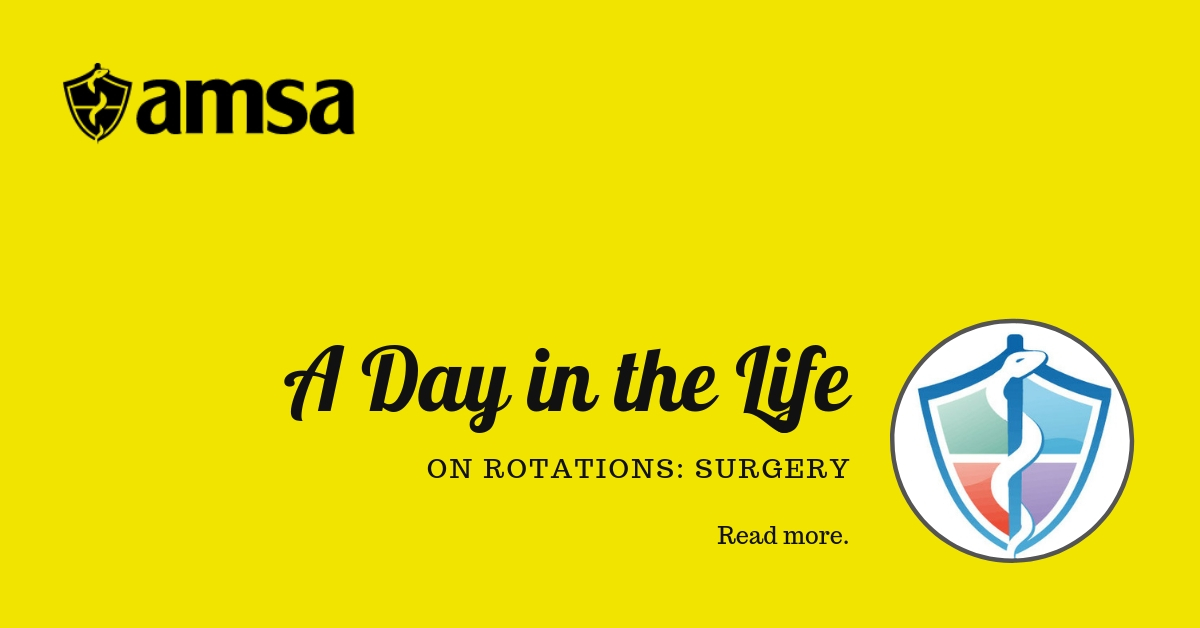3:30 am – Wake up.
4:00 am – Leave apartment.
4:15 am – Arrive at hospital.
4:20 am – Print out the patient list.
4:21 am – Split the list of 50 patients with your partner; go to a computer and write down every patient’s 24-hour vital signs, any reported fevers and what was done, what post-op day it is, what day of antibiotics and indications, discharge criteria.
5:29 am – Walk into a secluded conference room where all the interns and upper levels are, and sit at the back silently with the other students.
5:30 am – Morning rounds begin with the overnight residents reporting new admissions and updates on existing patients. Then, the team takes the elevator to the first patient floor, sees every patient in about 1-3 minutes a piece, and repeats the process by furiously walking down the stairwell to the next patient floor and the ones after that.
7:30 am – Surgeries begin for the day.
That was my morning routine for one month during my surgery rotation. Was it unappreciated scut work? Yes, but I did my best not to complain and told myself it is just part of being a student.
What time did I usually get home? 7:00 pm, 8:00 pm — the latest ever was 10:30 pm after a complicated Heller myotomy.
What time did I sleep? 11:00 pm or midnight, depending on how much I have studied for my NBME Surgery “Shelf” Exam and how much I am fighting with my body not to sleep so I can review more.
The environment is unforgiving. On top of not being myself, being not coherent for the majority of my wakeful hours, and being pimped in the OR by my residents and attendings on questions I do not know the answer to, I felt pressured to do things I am 100% sure I needed more guidance on.
I nervously consented one patient for a splenectomy, another for an appendectomy. Did I mention all of the potential adverse effects of those surgeries? I hope I did, and if I didn’t, my resident didn’t say a word as I spoke with these patients.
At another time, a resident told me at the end of the case to “close the patient,” handing me pick-ups and suture.
“I’ve never done this before, can you show me?” I said.
“Go ahead and try, I need to type the op note before the next surgery,” he quickly said.
Without saying another word, he stepped away from the OR table, took off his gown, tossed it in the trash, and went to the computer. I asked the nurse if she could show me, and thankfully she did.
On my last day of the month, two residents on my team reprimanded me for days missed because of sickness and for not being as engaged as I should have been on the rotation. The moment I got home, I breathed a sigh of relief that I survived the month. And for the first time in 31 days, I properly slept.
For as long as I can remember, I wanted to be a surgeon — someone who can fix a problem and see immediate results. I would receive instant gratification from patients and their loved ones. I wanted to become a surgeon for the respect and admiration. The highest salary a physician can make is by practicing as a surgeon.
However, my experience during this month repeated itself when I was on my orthopedic surgery elective, my ENT elective, my cardiothoracic surgery elective, both adult and pediatric services, and my OB-GYN rotation. Everyone I worked with, attending physicians included, were visibly tired. And many were verbally disgruntled, sometimes witnessing public (and private) shouting matches that included all combinations of interns, upper-level residents, fellows, attendings, physician assistants, and nursing staff. Whoever had the smaller ego would lose.
To this day, I respect the field of surgery as much as one can respect something. But, I no longer have a passion for it, and I feel at ease knowing that I realize that this is not my true calling.
One resident told me at the end of my rotation: “You must truly know that surgery is what you want to do for the rest of your life. Because if it isn’t, you will live a nightmare every single day of your life if you choose this path. The hazing doesn’t end when you finish residency. As you gain more years of experience, you are expected and rightfully so to take on more and more responsibility. And sooner or later, because of this high-risk high-reward environment, you will make your fair share of mistakes. Some much bigger and more severe than others, and every mistake ultimately will affect the care of your patients in some capacity. And every time you make a mistake, and even when you are honest with your attendings that you made it, you pray that you are not penalized and that your patient was not hurt by your own doing.”
“Would you have chosen a different field? Would you consider switching?” I asked.
“Something different? Yeah, probably something in primary care and not surgery-related. Would I switch now? Absolutely not. I am too deep into the game; and if I switched now, that means almost three years of residency for absolutely nothing. Three years of rarely talking to my friends and my family for nothing. Three years of being a zombie and at times resentful to the people around me… Changing careers is not an option at this point.”
Do you have a story to share about your experience on rotations? We’d love to hear from you! Email us at webmaster@amsa.org.
The author is a fourth-year medical student in Texas and an AMSA National Leader for the 2018-2019 leadership year.

